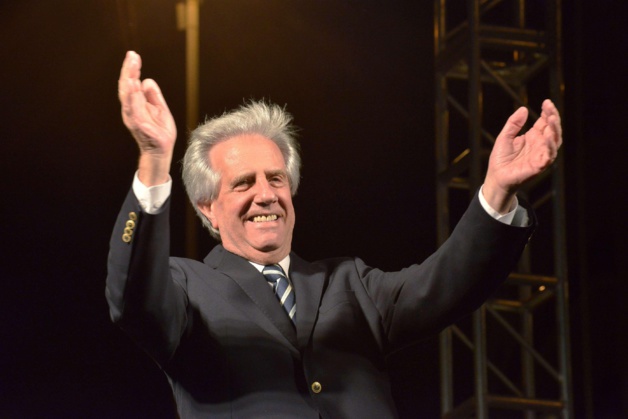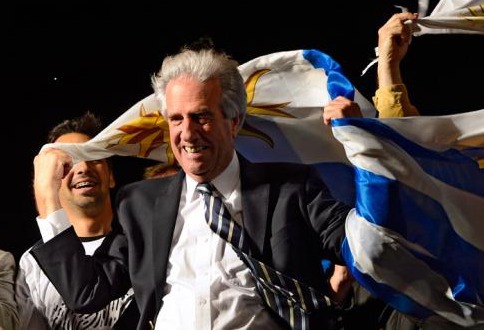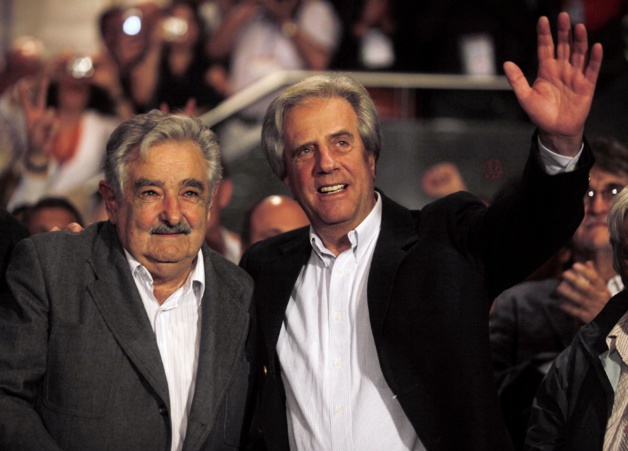
Credits DR
Tabaré is not just anybody in the Uruguayan political scene, and he is no political novice: this former President ruled the country from 2005 to 2010, and he was a strong symbol as the first leftwing head of state. By leaving office – as the law forbids two consecutive terms – he went back to normal life with an approval rating of more than 60%.
The 74 year old Tabaré, Socialist, Oncologist and Freemason, comes from a working-class family. Therefore, he is an exemplary case of the upward social mobility during the pre-dictatorial period: he was first a waiter, then carpenter, and he then decided to study medicine while working in administration. Specializing in Oncology, he graduated in 1969 and pursued his studies in France. He came back as a doctor, a professor and an entrepreneur. Several years later, he combined his medical profession with his Presidential term. This time he announced that he would leave his medical career to one side, in order to devote himself to his position as President of the Republic.
Before being illegally involved in the Partido Socialista at the end of the dictatorship (1973-1995), Tabaré had managed a small football club (El Progreso) for ten years. This forthcoming, honest and charismatic man was elected in 1989 as the first leftist mayor of the capital Montevideo, which represents half of the country’s population with its 1.4 million inhabitants.

His Presidential term between 2005 and 2010 is remembered for its important reforms on education, taxes and health. Tabaré is the forerunner for the Ceibal plan, which provides computers for all pupils, the social emergency plan implemented during the deep economic crisis (2001-2002), and restrictive anti-tobacco laws that were probably influenced by his oncologist profile e.g. he managed to take the tobacco company Philip Morris to court.
What are the challenges for Tabaré?
The first challenge for the newly elected President will be the economy. Today the context is far different from 2005: while the country was then emerging from the biggest economic crisis ever known, today it is coming to the end of ten years of prosperity. The word ‘end’ is obviously excessive, as it is more an economic slowdown and the unemployment rate is still good (6.2% in September 2014). However, this economic downturn of the entire region will give rise to necessary rigorous policies in order to reduce inflation and its resulting increasing budget deficit.
The second challenge will be on social issues. In his last speech, Tabaré promised to organize “a big National Meeting on topics that matter the most for Uruguayans like economic, social and political issues” and in particular on security, infrastructures and education, the three key topics of his campaign.
Finally, the last big challenge will be to face all the citizen’s of the country. The Uruguayans, because of a bipartisan political history – Partido Blanco vs Partido Colorado – are divided into two fairly distinct sides. The “them against us” or “bad ones against good ones” is far too present in political speeches and the population is getting tired of it and is waiting for a leader who is able to unite.
Which Tabaré after Pepe?

Despite his excellent popularity rate at the end of his Presidential term, his comeback into politics looks harsh for the simple reason that he is the one who will come right after the national, regional and world star of politics, the famous Pepe Mujica.
Firstly, there is the difficulty of coming after an atypical and divisive character. Who does not know the only President in the world who refused the privileges granted to a President of the Republic (residence, car, salary)? Who does not know the only President in the world who lives isolated in a farm away from the capital? Who does not know the only President in the world who is modestly dressed – if not almost ridiculously – even at a UN congress? At the same time respected and mocked, this man can fascinate or not, but he is known by (almost) everybody. Tabaré faces the risk of boring people with his tight and classical style, his seriousness and his impassivity. In his last campaign statement, Vázquez announced that he will stay in his private residency – in Montevideo, still – in order to enjoy “his biggest passion with his friends” namely fishing, and to enjoy his big family the best he could; he has been married for fifty nine years and he is the father of four children and the grandfather of eleven grandchildren. But would this statement be an attempt from the new President to do like the former guerillero Tuparamaro?
More importantly, how can he come after a man with vanguard political and social ambitions for the continent – and even for the entire world – who succeeded in getting the approval for laws like abortion, same-sex marriage and cannabis legislations? And especially when the Uruguayan population have in mind that the first obstacle for an abortion law was the Tabaré veto or also that he has always been against a law on cannabis and wants to strike it down.
The question is to know whether despite similar political orientations and a place in the same party, Tabaré will follow his old tracks which will create a break with Pepe politics or if he will change his style in order to be in line with what has been established by his predecessor.






























